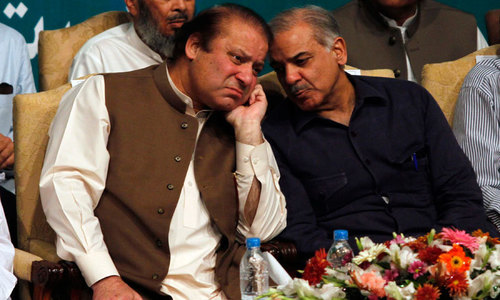ISLAMABAD: As legal experts are bewildered over the government’s move to reopen the Hudaibiya Paper Mills (HPM) corruption case which has already been settled by the country’s top judiciary, including the Supreme Court, Adviser to the Prime Minister on Parliamentary Affairs Babar Awan insists that revisiting the case will not only be valid but also legal and constitutional.
“Since former Punjab chief minister Shehbaz Sharif has never been tried in the Hudaibiya Paper Mills case, he can face fresh investigation in the famous corruption reference,” Mr Awan explained while talking to Dawn.
Prime Minister Imran Khan had on Monday asked his legal team to consider initiating a fresh investigation into the Rs1.2 billion HPM corruption reference against the Sharif family.
Citing Article 13 of the Constitution, Babar Awan explained that this provision did not provide any protection to Shehbaz Sharif or any other member of the Sharif family who had never been investigated or prosecuted by the National Accountability Bureau (NAB) earlier in the HPM case.
PML-N senator says fresh probe will amount to contempt as matter has been settled by top judiciary
Article 13 deals with the protection against double punishment and self-incrimination and ensures that no person is prosecuted or punished for the same offence more than once. Thus “doctrine of limitation”, which was always applied while moving appeals before appellate courts, had never been admissible in criminal matters and, therefore, it provided no protection to Shehbaz Sharif, the PM’s adviser said.
He said Shehbaz Sharif had never been arraigned as an accused in the HPM reference filed against the Sharif family during the Musharraf government. Therefore, he could be tried separately and the government could ask any investigation agency, be it the Federal Investigation Agency (FIA) or NAB, to proceed afresh and prosecute the PML-N president in a competent court of law, Mr Awan explained. Likewise, the protection of Section 403 of the Criminal Procedure Code was also not available to Shehbaz Sharif, he said.
The legal provision says that persons once convicted or acquitted cannot to be tried for the same offence and that any person who has once been tried by a court for an offence and convicted or acquitted of such offence will not be tried again for the same offence, nor on the same facts for any other offence in a different charge might have been made.
Even if hundreds of persons were involved in one case, Babar Awan explained, each accused will be dealt with separately and differently. He reminded that criminal judgements were always decided in “personnem” (individually) and not “in rem” (affecting other people also).
Likewise, a senior lawyer associated with the government said on condition of anonymity that the HPM reference concerned the allegation of money laundering and any issue other than money laundering case, which had not been dealt with previously or never before the judiciary, could be reinvestigated and proceeded. Whatever initiated would be done while remaining within the ambit of the high court and Supreme Court decisions, he said.
PML-N version
On the other hand, Senator Azam Nazeer Tarar of the PML-N was of the view that initiation of fresh investigation into the matter would be a contemptuous move. Not only the Lahore High Court (LHC) had closed the case, but the Supreme Court had also rejected a review petition moved by NAB. Thus the matter had been settled once and for all and the FIA director general or NAB chairman by reopening the matter could not sit over the judgements of the top judiciary, he argued.
On Jan 5, 2018, the Supreme Court, while rejecting NAB’s review petition in the HPM reference, had held that legal process was abused and due process was denied to former prime minister Nawaz Sharif and other respondents through “protracted” proceedings in the case. “We have come to the painful conclusion that respondents 1 to 9 were denied due process,” wrote Justice Qazi Faez Isa in a 34-page detailed verdict.
‘Legal process abused’
Justice Isa was also part of a three-judge bench, headed by Justice Mushir Alam, which had on Dec 15, 2017 rejected a NAB appeal against the 2014 LHC order that quashed the Hudaibya corruption reference against the Sharif family.
“The legal process was abused by keeping the reference pending indefinitely and unreasonably,” the judgement had regretted, adding that the respondents were denied the right to vindicate themselves since the reference served no purpose but to oppress them.
The judgement noted with grave concern NAB’s lack of commitment and earnestness at the relevant time because the bureau never produced any accused in the accountability court, did not seek to frame charges, did not examine a single witness and sought innumerable adjournments rather wanted the reference to be adjourned indefinitely (sine die).
The reference remained moribund for over four years and the NAB chairman did not submit an application under his signature for restoration/revival of the reference, and when he did it was not pursued, the verdict had deplored. “Thus the high court was justified to quash the reference and once it was quashed the question of reinvestigation did not arise,” highlighted the judgement.
Filed on Sept 20, 2017, the judgement said, NAB’s appeal was time barred by 1,229 days and under such circumstances, other than to procrastinate still further the agony of the respondents, no purpose would be served to condone the unreasonable delayed filing.
About NAB’s stance that additional documents, fresh material and foreign currency accounts had been unearthed by the SC-appointed Joint Investigation Team (JIT) in the Panama Papers leaks case, the verdict had observed that if this was so, it could not be categorised as fresh material because such evidence was already in NAB’s possession.
Published in Dawn, May 12th, 2021















































